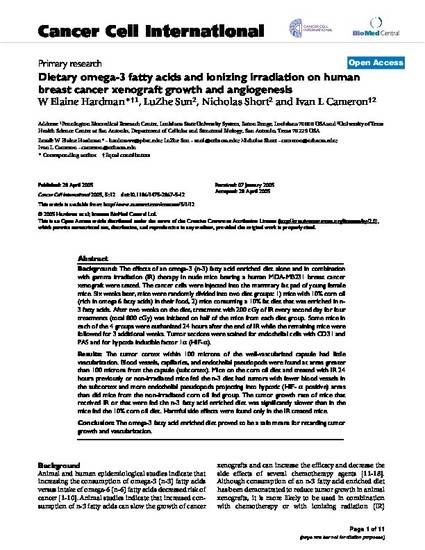
Background
The effects of an omega-3 (n-3) fatty acid enriched diet alone and in combination with gamma irradiation (IR) therapy in nude mice bearing a human MDA-MB231 breast cancer xenograft were tested. The cancer cells were injected into the mammary fat pad of young female mice. Six weeks later, mice were randomly divided into two diet groups: 1) mice with 10% corn oil (rich in omega 6 fatty acids) in their food, 2) mice consuming a 10% fat diet that was enriched in n-3 fatty acids. After two weeks on the diet, treatment with 200 cGy of IR every second day for four treatments (total 800 cGy) was initiated on half of the mice from each diet group. Some mice in each of the 4 groups were euthanized 24 hours after the end of IR while the remaining mice were followed for 3 additional weeks. Tumor sections were stained for endothelial cells with CD31 and PAS and for hypoxia inducible factor 1α (HIF-α). Results
The tumor cortex within 100 microns of the well-vascularized capsule had little vascularization. Blood vessels, capillaries, and endothelial pseudopods were found at areas greater than 100 microns from the capsule (subcortex). Mice on the corn oil diet and treated with IR 24 hours previously or non-irradiated mice fed the n-3 diet had tumors with fewer blood vessels in the subcortex and more endothelial pseudopods projecting into hypoxic (HIF- α positive) areas than did mice from the non-irradiated corn oil fed group. The tumor growth rate of mice that received IR or that were fed the n-3 fatty acid enriched diet was significantly slower than in the mice fed the 10% corn oil diet. Harmful side effects were found only in the IR treated mice. Conclusion
The omega-3 fatty acid enriched diet proved to be a safe means for retarding tumor growth and vascularization.
